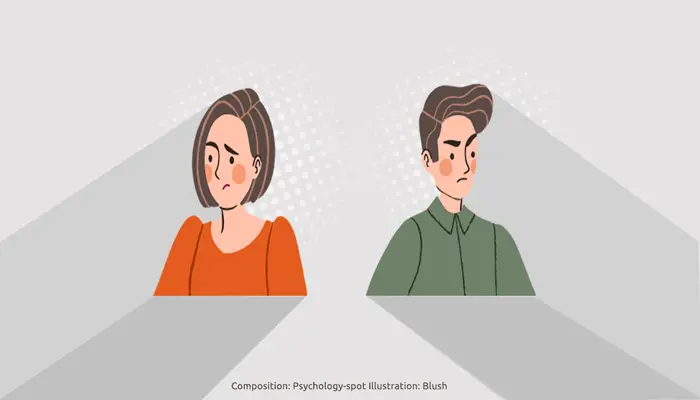
Dealing with rejection is not easy. No one has taught us. Despite this, we all live experiences of rejection throughout our lives. Feeling rejected is not pleasant, but it is not unusual either. In fact, although the rejection in love is one of the most painful, we can also be rejected on a professional level or even be marginalized by the family, a group of friends or our culture of origin.
Why does rejection hurt so much?
Rejection literally hurts. A study carried out at the University of Michigan found that rejection and contempt share the same neural circuits as physical pain. Therefore, when we are despised and rejected, the pain we experience is not only emotional, but we also feel it on a physical level.
Those rejections not only hurt, they are impressed inside us. As a general rule, as time goes by, it becomes more difficult for us to remember exactly the intensity of a physical injury, but we are able to recall with particular vividness the pain we felt when we were rejected. We can bring up every detail and relive the situation with a fairly similar emotional intensity. In other words, while the memory of physical pain is fading, the memory of rejection remains quite clear in our memory.
Such an intense reaction to rejection can be rooted in our most remote past. When we lived in the caves, being left alone was equivalent to a death sentence since we could not survive in such adverse conditions, that is why our brain has developed a kind of alert system to warn us of the risk of ostracism. This way we can correct our attitude as soon as possible so as not to lose the support and protection of the group.
However, the fact that our brain activates that alarm does not mean that we must passively suffer the consequences of rejection. We need social ties, but we don’t have to cling to people who make us suffer.
How do you deal with rejection?
To deal with a rejection, we must make sure that we do not become our own worst enemies as these situations often activate a self-blaming mechanism in which we constantly recriminate ourselves. Therefore, the emotional pain of rejection is compounded by negative ideas that do not stop spinning in our minds. How to escape from that loop?
1. Self-kindness versus self-judgment
When we notice that our inner critic is activated and begins to distort our perspective, we must redirect that internal speech with kindness towards more positive and objective directions. Basically, we must remember that within us lives a small child who has been hurt, so that instead of recriminating and blaming him, we must treat him with compassion and empathy so that he can get through that moment. It is not about feeling sorry for ourselves or denying our mistakes or responsibilities, but about not judging ourselves excessively harshly or avoiding becoming cruel to ourselves.
2. Denial versus radical acceptance
Sometimes when rejection is extremely painful, we have a tendency to protect ourselves by denying reality. In fact, it is likely that we will seek refuge in the past by remembering happy moments or that we will entrench ourselves in an imaginary future in which everything is perfect. These attitudes, however, do not allow us to turn the page.
Instead we must practice radical acceptance. It does not mean being happy with what happened or approving it, but just verifying the fact. As William James wrote, “Acceptance of what has happened is the first step in overcoming the consequences of any misfortune.” With radical acceptance pain does not disappear completely, but the suffering dissipates. And when you stop suffering, the pain will be more bearable. Then we will be in a position to react to stop pursuing something unattainable and set new goals that make us happy and are within our reach.
3. Common humanity versus isolation
When we are rejected, we can feel that the world is on us and that we are alone, but in reality we are not the only ones who have been through something like this. We have all suffered rejection and recovered. Even many famous people have been rejected. Simply remembering this connection can help us avoid feeling that the world is conspiring against us or that we are isolated.
It is also worth seeking support from those closest to us. Many times we do not tell the experience of rejection for fear that the others will think that we have failed, but in reality most people are more empathetic than we suppose and will reach out to us when we feel bad. Having a friendly shoulder to cry on may be all we need to overcome rejection.
4. Mindfulness versus overidentification
Mindfulness is a practice that consists of focusing our consciousness in the present moment to face a thought or an experience without judging them. Mindfulness helps us avoid over-identifying with the painful thoughts and feelings that arise from rejection.
We can feel those negative emotions and thoughts, but without allowing them to take over and sink us. This practice will prevent our inner critic from distorting reality and generating catastrophic scenarios that make us hitting bottom. Instead, it will leave behind a sense of serenity and control that will allow us to deal with rejection in a more sensible way.
5. Tragedy versus opportunity
To overcome rejection we must stop focusing on what we lost to focus on what we can gain. At first it is difficult because negative emotions and thoughts put gray lenses on our eyes, but we must remember that it is probably not the first time that we’ve been rejected.
A rejection can become the opportunity to undertake something new and dare to take a different path. That a door closes does not imply that we cannot be happy or achieve our goals, but only that that was not the way. Sometimes a rejection can become the push we needed to get out of our comfort zone and do wonderful things or meet great people.
Sources:
Kross, E. et. Al. (2011) Social rejection shares somatosensory representations with physical pain. Proceedings of the National Academy of Sciences; 108(15) 6270-6275.
Baumeister, R. (2005) Rejected and alone. British Psychological Society;18(12): 732-735.



